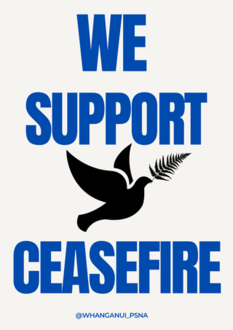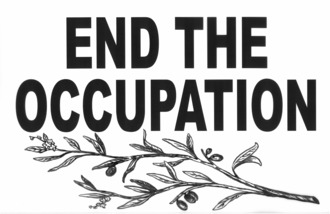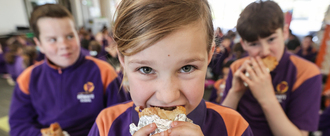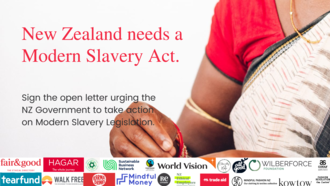-
Say NO to Youth Offender Boot CampsIt's the responsibility of people in government to make informed, thoughtful decisions that have long-term benefits for the future of the country. They should use the best knowledge, information and expertise available to guide their decisions to ensure all people and communities thrive, especially our young people. By proposing to bring back the youth offender boot camps, this Government is not following the best expertise or knowledge. Youth offender boot camps are proven to be ineffective. When they were trialled in 2008, reoffending rates were 85-87% within two years [2]. Despite the evidence that they do not work, this Government is proposing to bring them back. Youth offender boot camps for young people have been proven locally, and internationally to be unsuccessful in preventing young people from reoffending due to their failure to respond to the long term and complex reasons why young people become involved with the justice system in the first place. Youth offender boot camps punish children who have been failed by an unequal society. They disproportionately impact Māori youth and children who have experiences of homelessness, violence, poverty, mental health issues, or disabilities. Aotearoa’s youth offender boot camps of 2008 were shockingly unsuccessful, with reoffending rates of 85-87% within two years [2]. Children and young people need care and community connection. Removing children from their homes and communities, and punishing them without addressing the root causes of harm – such as disadvantage, challenging circumstances, economic need, and social disconnection – will only cause more harm. Youth boot camps isolate young people from the resources and social connections they need to heal and be supported. Instead of solving problems caused by a lack of resources and services in many communities, our criminal justice system has been designed to lock people away. This hurts all of us, but it especially hurts Māori. This is because systemic racism means that young Māori are more likely to be arrested and convicted for the same crime as non-Māori [3]. Youth offender boot camps will continue this injustice and cause further harm to communities already hurting from ongoing colonisation. The re-establishment of these boot camps will reinforce discriminatory attitudes, and misdirect resources away from solutions that address the root causes of harm. Instead, we can call on our decision makers to make sure young people and children are safe and cared for, by providing stable housing, high quality education, adequate incomes, food, and essential health, mental health and disability services. The punitive approach of youth offender boot camps will not help young people, and will not address harm in our communities. This is why we are calling on the Government to say NO to Youth offender boot camps and say YES to addressing issues of poverty, homelessness, racism, and the mental health crisis. If you agree with us please sign this petition and share it with your family and friends! References and extra reading [1] RNZ. (2024). Boot camps for young offenders are expensive and do not work, critics say. https://www.rnz.co.nz/news/national/510938/boot-camps-for-young-offenders-are-expensive-and-do-not-work-critics-say [2] 1News Reporters. (2024). Youth offender boot camps ``become really abusive” – lawyer. 1News. https://www.1news.co.nz/2024/03/06/youth-offender-boot-camps-become-really-abusive-lawyer/ [3] Rangatahi Māori and Youth Justice Oranga Rangatahi https://iwichairs.maori.nz/assets/PDF/RESEARCH-Rangatahi-Maori-and-Youth-Justice-Oranga-Rangatahi.pdf 95bFM Radio Get Action! Say NO to Youth Offender Boot Camps w Clara Donne: 5 June, 20241,555 of 2,000 SignaturesCreated by The Criminological Society of the University of Otago.

-
Protect Women: Make Stalking IllegalMaking stalking a crime will help to protect our basic human right to live safely and free of fear in Aotearoa NZ. We need to do this now to prevent more severe distress and physical harm from stalking, including murders committed by stalkers. • Stalking is terrifying and common, and it can be deadly. Making stalking a crime would enable coordinated, systematic responses so victims get prompt, consistent, and effective protection which is not currently provided [1]. • Stalking is illegal overseas, but not explicitly in NZ, making it very difficult and often impossible for victims/survivors to get the protection they need. • Prior to the election, now-Minister Paul Goldsmith criticised the previous government for dragging its feet in this area, but he now indicates criminalising stalking is not a priority. • Police methods to determine stalking risks are inadequate and not fit-for-purpose, as identified by the Independent Police Complaints Authority in 2024, after the death of Farzana Yaqubi on 19 December 2022 [2]. Farzana's stalking complaint was still “awaiting investigation” when she was murdered by her stalker almost 8 weeks after she first contacted Auckland police. If stalking had been explicitly illegal, police would likely have had the correct tools to keep Farzana safe immediately. Stalking is a pattern of unwanted repetitive and persistent intrusions into a person’s life. • Physically following someone is only one kind of stalking. Common repeated stalking actions include: digital stalking; showing up uninvited; driving past a home or workplace; confrontation; messaging repeatedly; posting on social media; delivering gifts; using spyware to get private information; making threats; contacting people close to the victim; and sabotaging the victim’s freedom and prospects. • To be considered stalking, these actions must be part of a pattern of repeated unwanted intrusions into someone’s life. • Stalking is common. In the USA, 1 in 6 women, and 1 in 17 men experience stalking in their lifetimes. NZ does not yet collect stalking data but harassment and threats, which are consistent with stalking, are two of the five most common crime experiences (2021 NZ Crime and Victims Survey). • Young women, recently separated women, and those experiencing intimate partner violence are most commonly affected by stalking. Wāhine Māori, disabled women, rainbow women and trans people, and migrant and refugee women are disproportionately impacted. • Those targeted for stalking include politicians, journalists, and celebrities, which can dissuade women from public roles or from speaking out. This silencing of women has a strong negative impact on both gender equity and our democracy. Stalking usually takes a heavy toll on victims’ emotional, mental, and physical well-being and is often far more dangerous than it looks from the outside. • It is usually designed to control the victim through intimidation which is why it is so terrifying. • Stalking can, and does, lead to physical violence, even death. • As one victim put it: “I always thought at the beginning that if I could just ride it out then he would stop. But that never happened and it got worse and worse. It was very, very scary. It was extremely isolating […]there was never a time that I could escape it, ever.”[3] NZ’s current laws: out-of-date • Various stalking-related behaviours are prohibited across a patchwork of fragmented, piecemeal, and poorly understood statutes, which fail to capture stalking's underlying harmful pattern. • The lack of a stalking law prevents coordinated responses and prevents victims of stalking from getting prompt, consistent, and effective protection. • Overseas, standard practice is to criminalise stalking, including in the US, Australia, England, Wales and the European Union. • We recognise every part of our justice system has a fundamentally racist track record: arresting, prosecuting, convicting, and incarcerating Māori at vastly higher rates than non-Māori. Over-incarceration of Māori continues to be used as a tool of on-going colonisation. We support Māori-led innovation through devolved resourcing and decision-making to address these issues, and we support sentencing that emphasises rehabilitation and keeps people safe. As well as criminalising stalking, the government needs to resource the prevention of stalking: • Police training to recognise stalking and its harms, and take action to stop stalkers immediately • Anti-stalking intervention programmes • Public awareness campaigns about stalking and its harms • Training for social and community workers re prevention and victim protection • Comprehensive data collection on stalking prevalence Women's safety needs higher prioritisation - politicians keep stringing us along. • In August 2020 Justice Minister Andrew Little agreed a review of the law was needed. • In 2021, the next Justice Minister Kris Faafoi committed to addressing the lack of legal redress for intimate partner stalking. However, nothing was done. • In 2023, we worked to educate the political parties that action on stalking is urgent. Prior to the election, the National Party publicly supported the inclusion of stalking as a crime within the Crimes Act 1961.[4] New Zealanders need the National-led Government to act now to prevent more innocent people from living in fear and being harmed or murdered. A note from the ActionStation team: https://bit.ly/3woVhAW References: [1] For more info on the policy background of this petition see: https://awc.org.nz/stalking/ [2] https://www.ipca.govt.nz/Site/publications-and-media/2024-media-releases/2024-apr-18-investigation-response-farzana-yaqubi-online-report-.aspx [3] https://womensrefuge.org.nz/intimate-partner-stalking/ [4] https://www.nzherald.co.nz/nz/election-2023-four-political-parties-pledge-to-strengthen-legal-protections-against-stalking/FQF3HDBPRBBFRLXQGJZODDRFVM/22,041 of 25,000 SignaturesCreated by Coalition for the Safety of Women and Children and AVA Anti-Violence Action
-
Immediate and Permanent Ceasfire in GazaWe have a responsibility to the Palestinian and Israeli families living in this community who are impacted by these events. A community that upholds international law and human rights is a safer community for all. The observance of human rights and the condemnation of acts that breach those rights, namely acts of violence and terror against civilians, is an important pillar of our democracy, enshrined in the New Zealand Bill of Rights Act. Speaking up has moral and political weight. These events impact our community well-being of Whanganui, especially when we see on a daily-basis through the media, families and young children exposed to extreme acts of violence. Having leaders who call out these atrocities and call for action is important and impacts our collective well-being. Failure to call out acts of violence and terror against civilians is not a neutral position. International law is persuasive and relevant to your decision making. New Zealand is a member state and is bound by UN resolutions. There are numerous resolutions that have been passed, the most recent being UN Security Council Resolution 2728 adopted on the 25th of March 2024 calling for a ceasefire. There are a number of local bodies in Aotearoa/New Zealand and internationally who are calling for a ceasefire. The more voices that join this call the stronger it becomes. This council has a strong track record of standing up for human rights and condemning acts of violence against civilians. Most recently, in March 2022, the Whanganui District Council voted unanimously to support a motion to condemn the Russian government and stand by the people of Ukraine.188 of 200 SignaturesCreated by Ruby Haazen
-
Stop funding the genocide: change council policy to align with UN resolutionWe seek that both councils align their procurement policy with UN Resolution 2334, and the obligations placed on member states by that resolution. There is no question that Israel is currently in breach of many international laws. As a starting place, Israel is illegally occupying Palestinian territory. UN resolution 2334 refers to the territory held by Palestine in 1967 and the illegal occupation of that territory by Israel. As an occupier state, Israel has legal obligations to protect Palestinians who live in their territory. Israel in is breach of these obligations by directly targeting and knowingly harming Palestinian civilians. Israel does not have the right to attack citizens whom they have a duty to protect. International agreements are not directly enforceable on crown agencies where their provisions have not been incorporated in domestic legislation. However, international agreements are significant even when they are not incorporated into domestic legislation as there is considerable political and moral force on governments to act in accordance with their international obligations. UN Resolution 2334 In resolution 2334, Israel was requested to cease all settlement activities in the occupied territory. In support of this, Clause 5 of the resolution calls upon all states to distinguish between the territory of the state of Israel and the territories occupied since 1967 in all dealings with the region. The Resolution was supported by the New Zealand government. Subsequently, in February 2020 the United Nations published a database of over 100 companies it considered were doing business in the Israeli settlements. On 1 July 2023, the United Nations reviewed the list and removed 15 companies from the list due to them having halted activity in the Israeli settlements. United Nations Resolution 2334 declared that all member states should not deal with organisations doing business in the illegally occupied Palestinian Territories, this includes Aotearoa/New Zealand. We call on our local government to align its procurement policy with UN resolution 2334.99 of 100 SignaturesCreated by Ruby Haazen
-
Initiate a Royal Commission of Inquiry into ACC New ZealandThe Accident Compensation Corporation (ACC) was established in 1974 with the noble intention of providing comprehensive, no-fault personal injury coverage for all New Zealand residents. However, over time there has been a growing number of complaints about its lack of transparency, unfair practices, and denial of rightful claims. My father battled with ACC for 40 years. Like him, many others are forced to fight to be heard, for their injuries to be recognised and receive the support and funding they are legally entitled to. This is not an isolated incident but a systemic issue affecting countless New Zealanders who have been injured or disabled due to accidents. The current system is failing those it was designed to protect, leaving them in financial hardship and emotional distress. A Royal Commission of Inquiry into ACC would provide an independent review of the system's operations and policies. It would shed light on any malpractices or systemic issues within the organization that are causing unnecessary suffering for claimants. We call upon our government representatives - those who have the power to initiate this inquiry - to act now. Let's ensure that our fellow citizens receive fair treatment from ACC and that their struggles are not ignored any longer. Please sign this petition today; let us stand together for justice and fairness in our accident compensation system.536 of 600 SignaturesCreated by Hannah Sheath
-
Stand with early childhood teachers to save pay parityTeachers, parents, whānau and communities fought for two decades to win respect, recognition and pay parity for teachers in early childhood education. After finally achieving progress with pay parity, the National, ACT and NZ First coalition Government are initiating radical changes in early childhood education. They have signalled funding changes that threaten the pay of tens of thousands of teachers and risk children’s wellbeing by rolling back safety regulations. Removing protections to teacher pay and safety regulations are not new ideas. They are failed ideas that enable unscrupulous employers to cut corners. Ultimately, it is tamariki and staff who suffer when providers have a license to put profit before providing great care and education. We know that for tamariki to have the best start in life they need great foundations and the best possible beginning to their lifelong journey. Every child, no matter where they live or how much their parents earn, should have access to quality early childhood education, Māori medium, and Pacific language services that suit their needs and community, which place culture and identity at the heart. Kōhanga Reo, Puna Reo and early childhood teachers are trained and qualified to make sure our youngest children get the best teaching and learning – just like teachers in kindergartens and schools. Regardless of where our kaiako work, if they work to grow our tamariki and mokopuna they should have their mahi valued equally. Respect our youngest mokopuna in education, their kaiako, and their whānau. Don’t let Minister Seymour attack teacher conditions – the learning conditions for our mokopuna. Take us forwards, not backwards!11,626 of 15,000 SignaturesCreated by NZEI Te Riu Roa
-
Israel Sanction Act: Delay Means Palestinians PayDespite rulings from the UN General Assembly and the International Court of Justice, the state of Israel is continuing to kill Palestinians relentlessly in what are widely considered war crimes, including: - As of the 24th of March, 32,000+ Palestinians have been killed and 74,000+ injured. The majority of civilians killed (60%) are women and children[17]. - More journalists have been killed in this war than in other wars or events in the last 30 years. Before the Gaza war (Between 2001-22), at least 20 journalists were also killed by the IDF, with no one ever being charged or held accountable[18,19]. - More children have been killed in this war than in any global conflict in the last four years (between 2019 and 2022)[20]. - Gaza is experiencing the world's worst man-made hunger crisis[21]. As of March, the entire population in the Gaza Strip (2.23 million) is facing high levels of acute food insecurity[22]. Famine (the most extreme level of food deprivation) is imminent in central and northern Gaza. It is projected to increase between mid-March and May 2024, placing 70% (around 210,000 people) of the population at death's door. -As of the 21st of March, at least 56% of all buildings/structures in the Gaza Strip have been destroyed by the IDF. These include structures such as houses, housing units, schools and mosques[23]. Are these not sanction-worthy crimes? NZ also has legal obligations and must impose sanctions on the state of Israel for their flagrant violation of human rights, war crimes against the Palestinian people and for failing to comply with the ICJ rulings [24]. Legal obligations: International humanitarian law (IHL) -As of the 25th of March, The UN Security Council (for the first time) unanimously passed a resolution demanding an immediate ceasefire in Gaza during Ramadan[25]. The resolution is legally binding and requires immediate implementation by the international community to use all forms of leverage, like imposing sanctions and arms embargo on Israel, to make it comply with international law, e.g., ensure the protection of civilians[26]. Genocide Convention -All states parties to the Genocide Convention have a "common interest" in ensuring the prevention, suppression, and punishment of genocide. In their case, the ICJ also concluded that South Africa has a plausible case that Israel's acts could amount to genocide and that Palestinians are to be protected from genocide by Israel[27]. Hence, NZ has a legal obligation to do what it can to ensure that Israel complies with the court's orders. Good faith - NZ is legally obligated to act in good faith towards the ICJ ruling as it is a UN member. We demand that the Minister of Foreign Affairs stop waiting for an imaginary threshold to be reached before taking action. Stop waiting for the genocide to become worse than it already is. Any help or sympathy at that point would be too little too late. We need immediate action from our leaders now! [1]https://www.icj- [2] https://euromedmonitor.org/en/article/6242 [3] https://www.legislation.govt.nz/act/public/2022/0006/latest/whole.html [4] https://www.oxfam.org.nz/news-media/israel-government-continues-to-block-aid-response/ [5] https://www.aljazeera.com/news/liveblog/2024/3/23/israels-war-on-gaza-live-netanyahu-brushes-off-blinken-over-rafah-attack?update=2793464 [6] https://twitter.com/UNLazzarini/status/1771917857598693549?ref_src=twsrc%5Etfw%7Ctwcamp%5Etweetembed%7Ctwterm%5E1771917857598693549%7Ctwgr%5E8a216506fe64bd17cd998bf5cebea06d6e1bb114%7Ctwcon%5Es1_&ref_url=https%3A%2F%2Fenglish.almayadeen.net%2Fnews%2Fpolitics%2Furnwa-chief-outraged-by-israeli-ban-of-food-convoys-to-north [7] https://www.unrwa.org/what-we-do/relief-and-social-services/unrwa-registered-population-dashboard [8]https://www.icc-cpi.int/sites/default/files/RS-Eng.pdf [9]https://twitter.com/antonioguterres/status/1771653572846870970?ref_src=twsrc%5Etfw%7Ctwcamp%5Etweetembed%7Ctwterm%5E1771653572846870970%7Ctwgr%5E066f539f2170a28f1c1f50144c44defb5930588d%7Ctwcon%5Es1_&ref_url=https%3A%2F%2Fwww.aljazeera.com%2Fnews%2Fliveblog%2F2024%2F3%2F24%2Fisraels-war-on-gaza-live-19-killed-as-israel-again-fires-on-aid-seekers [10]https://www.reuters.com/world/middle-east/aid-trucks-entering-gaza-must-double-meet-basic-needs-wfp-says-2024-03-06/ [11] https://edition.cnn.com/2024/03/01/middleeast/gaza-aid-israel-restrictions-investigation-intl-cmd/index.html [12]https://apnews.com/rafah-gaza-population-surge-photos [13]https://www.theguardian.com/world/2023/dec/07/idf-israel-gaza-refuge-zones-cruel-mirage-say-aid-agencies [14]https://peacenow.org.il/en/the-israeli-government-declares-8000-dunams-in-the-jordan-valley-as-state-lands [15] https://www.aljazeera.com/news/2024/3/7/israels-illegal-west-bank-settlement-plans-face-global-condemnation [16]https://www.amnesty.org/en/latest/campaigns/2019/01/chapter-3-israeli-settlements-and-international-law/ [17]https://healthcluster.who.int/countries-and-regions/occupied-palestinian-territory [18]https://www.npr.org/2023/12/03/1215798409/palestinian-journalists-killed-gaza-israel-hamas-war [19] https://cpj.org/reports/2023/05/deadly-pattern-20-journalists-died-by-israeli-military-fire-in-22-years-no-one-has-been-held-accountable/ [20] https://turkiye.un.org/en/263401-gaza-number-children-killed-higher-four-years-world-conflict [21] https://www.oxfam.org/en/press-releases/gaza-hunger-figures-worst-record-says-oxfam [22] https://www.ipcinfo.org/fileadmin/user_upload/ipcinfo/docs/IPC_Gaza_Strip_Acute_Food_Insecurity_Feb_July2024_Special_Brief.pdf [23] https://www.conflict-damage994 of 1,000 SignaturesCreated by Abdul Safi
-
Make food regulations fair and affordable for small businessesOur vision for a thriving food industry is one where there is an abundance of small, locally owned and operated food producers and mobile food/drink businesses offering a diverse range of choices at reasonable prices. This would support regular markets and community events that transform our public spaces into community spaces of music and cultural vibrancy; play, laughter, connection, and warm full bellies. One of the greatest barriers to running such businesses is the resourcing (cost, time and energy) required to comply with food safety regulations. Currently, the logistical, administrative and financial burden of registration and certification is the same for all domestic food businesses, regardless of size. A small coffee cart that only operates at a few summer events each year pays $500 - $1,000 annually in compliance costs, depending on region. While a large restaurant - such as a fast food outlet - pays the same amount even though it has exponentially higher revenue from being open all day on most (if not all) days every week and so can easily absorb these costs. High regulatory costs for small food businesses to operate impede their economic viability and their ability to remain competitive. Furthermore, due to loss and lack of government funding, MPI recently passed legislation to charge all domestic food businesses a new annual "Food Act" levy of $132 (plus an $11 collection fee) for expanding five of its existing services (including rules setting; oversight; and education) and adding three entirely new services (nationwide interventions to raise performance; national monitoring programmes; and systems auditing). The levy is a flat fee for all businesses (regardless of size) however, because the fee is charged on a “per site” basis, small mobile food businesses that prepare food in a kitchen and sell food from a vehicle (e.g. food truck or cart) would end up paying double the levy! This is totally unfair given a fixed premise, like a large restaurant, would only pay the base fee. The new levy would be the third annual fee all food businesses in Aoteaora (whether they are registered with their local council or MPI) have to pay to retain their registration to legally trade in food. The fee would also be “growing annually in line with inflation assumptions”. As with the existing regulatory fees structure, charging the same levy for all businesses - regardless of size or revenue - means a mobile food vendor that only operates one morning a week will have to pay the same fee as a McDonald's restaurant that is open all day, every day of the year. For small food businesses, such as mobile food vendors and coffee carts, the current regulations are already too cumbersome and costs beyond sustainable. They will never benefit anywhere close to enough to justify these additional costs, let alone the current costs and requirements of compliance. The full, 52-page proposal is available here: https://www.mpi.govt.nz/dmsdocument/60877-Proposal-to-maintain-and-expand-New-Zealand-Food-Safetys-regulatory-services-under-the-Food-Act-2014-Food-Act) Based on past experience, we also believe Food Safety NZ has been excessive and inefficient with its spending of funding for services and are concerned that increasing funding will lead to greater inefficiency of spending with no benefit to small food businesses. Small food businesses have many unique benefits including: supporting local economy; supplying a more diverse and unique range of food that is made locally from ingredients that are local, fresh, and wholesome; allowing innovation; creating competition (which encourages lower food prices); supporting community and fundraising events (such as school fairs); adaptability and flexibility. The Covid pandemic specifically highlighted the value of food markets and mobile food vendors, where the ability to shop outside was an important option to avoid spreading disease. The current food safety system favours large businesses and promotes an industry where small, unique and community-oriented businesses struggle to survive and will gradually disappear resulting in a monopoly of large, homogenous food businesses. The change will not be immediate and obvious, but it will be very significant and detrimental to our well-being and quality of life. We already have plenty of examples where large, multinational businesses have dominated over and replaced small, local businesses. Whilst food safety is important, it is also vital that regulations and fees are not so burdensome that the viability of small food businesses is undermined. Especially as inflation and high costs are already making it challenging for these businesses to stay afloat. The costs and requirements to comply with food safety regulations for small food businesses need to decrease significantly and more accurately reflect their level of risk and the revenue they are able to generate so they can continue to support vibrant, connected and sustainable communities. Imagine a future where our local food scene isn’t just a significant player in the economy but also a shining star in New Zealand’s culture, making life richer for locals and visitors alike.1,896 of 2,000 SignaturesCreated by Ben Plows-Kolff
-
Stop the cuts - Protect Our School LunchesSchools are a place where kids go to learn, connect, and grow. But they can’t do this if they are hungry. In Aotearoa, one in five children live with food poverty. And poor nutrition is not limited to kids in food poverty, with only 5 per cent of children aged 0-14 years getting the recommended amount of fruit and vegetables per day. Nutritious food is essential for learning but many kids are missing out on this. This is why Ka Ora, Ka Ako - the school lunch programme was created. It currently offers 230,000 students in about 1,000 of the least advantaged schools lunches, and is a major safety net against food poverty and poor nutrition. If the Government chooses to remove the programme from schools it would rob students of their potential and then we all lose from the missed contribution they can make to our communities. Research from the PISA (Program for International Student Achievement) shows that students who miss meals due to lack of money are two to four years behind their peers who never miss meals in educational achievement(1). Prime Minister Christopher Luxon has said his Government is focused on enhancing school achievement. Cutting school lunches goes against this - and will instead reduce school achievement. Parents of children at schools with free lunches told researchers the lunches helped reduce their grocery bill, increased financial security and helped change their child’s food choices - towards healthier options(2). Principals at schools receiving Ka Ora, Ka Ako say the programme has made a huge and lasting impact on students and losing it would be a tragedy. Principal of Te Kura Māori o Ngā Tapuwae in Māngere East Arihia Stirling said on TVNZ’s Breakfast programme, children are more focused and the number of students having to work to help pay for family basics has fallen as a result of the free lunch programme(3). “What I say to the Associate Minister of Education is do not take the food out of our children’s mouths…this is so needed in the communities we serve.” Seletute “Tute” Mila, principal of Arakura School in Wainuiomata, Lower Hutt, told The Press, Ka Ora, Ka Ako was a “critical programme” which her students loved(4). The same story reported comments by Chisnallwood Intermediate year 8 student Ryder who said the lunches should stay “... mainly because that is a lot of students’ meal for the entirety of the day ... most people don’t have food at home.” Before the lunches were introduced in 2022, Ryder said he struggled to learn “because my brain just got like, ‘oh, I’m so hungry’.“After I ate the lunches I’d always have energy to do stuff.” All students at these schools receive a free healthy lunch which they share together. The provision of tasty, healthy lunches to all the students encourages them to eat nutritious food that will fuel their bodies and minds, and promotes social bonding through sharing a meal together. Students all over New Zealand should have healthy and free school lunches - which are essential to address food poverty and poor nutrition. This is why we are asking the government to keep the free school lunch program, if you agree please sign and share this petition. References (1) https://www.phcc.org.nz/briefing/food-poverty-nz-teens-creating-achievement-lag-four-years (2) https://academic.oup.com/heapro/article/38/4/daad093/7243592?login=false (3) https://www.1news.co.nz/2024/03/05/no-doubt-free-lunches-programme-has-helped-results-principal/ (4) https://www.thepress.co.nz/nz-news/350201994/most-people-dont-have-food-home-students-and-staff-fear-impact-lunch-cuts26,948 of 30,000 SignaturesCreated by Health Coalition Aotearoa
-
Open Letter to The NZ Government to Take Action On Modern Slavery LegislationThe decision to delay modern slavery legislation affects everyone, from the beginning of the supply chain to the end consumer. Urgent action is needed. In July 2023, the Labour government announced its plan to draft a modern slavery disclosure law, requiring companies earning more than $20 million a year in revenue to publicly disclose and address the risks of modern slavery within their supply chains. Detailed advice, including advocating for due diligence, was received from advocacy groups and experts in modern slavery legislation. Significant progress was made on drafting legislation, covering both business and public sector supply chains. But, despite repeated urging from the public, it was not introduced into Parliament before the last election. Now it is your turn. We are depending on your government to do the right thing, to introduce this legislation into Parliament and make it law. But we have since been told that your government has “yet to make a decision” on this proposal (3). Not only does this lag put New Zealand behind other OECD countries, but it affects businesses that are trying to do the right thing as they continue operating in a market where unfair competition can thrive due to unethical labour practices. New Zealanders want legislative action on modern slavery. An open letter from the business community was written in 2021 along with a 37,000-strong public petition. In 2023, more than 6,000 people demanded that the then government stop delaying progress. In February this year, ethical investors urged you to act. There is no need for any more hold-ups. We ask once again that your National-led coalition government make urgent progress on this issue. We pride ourselves on being a country that cares, a place where everyone gets a fair go. By stalling work on a modern slavery law, aren't we falling short of that ideal? Prime Minister Luxon, in 2022 you said, “Something I feel very passionate about is modern slavery… I’ve been really passionate about [it] for a long time. That’s something I think we could do a better job of and have modern slavery legislation, and make sure that we’re holding ourselves up to a standard.” (4). We are holding you to your own standards. Please Introduce a Modern Slavery Act into New Zealand Law Now! Yours sincerely, Fair&Good Ethical Directory With the support of: Hagar NZ, Tearfund, World Vision, Trade Aid, Fairtrade, Sustainable Business Network, Ethically Kate, Mindful Money, Walk Free, The Wilberforce Foundation, Mindful Fashion, Kowtow, 27 Seconds, All Good, AS Colour, Addington Café, Aho Creative, Bennetto, Borneo Bags, Burrow&Be, Caritas, The Centre for Research on Modern Slavery (UoA), Collective Canvas, Common Good Coffee, Common Sense Organics, Conscious Copy, Crave Café, Direct Impact Group, NZ Ethical Employers, Ethos&Co, Fairfield Trust, Fairplay, Fashion Revolution, Grow Good, Good Gold, Hamodava Coffee, HEED Consulting, Holi Boli, House of March, The Human Trafficking Research Coalition, IncaFe Organic Coffee, Joyya, Just Kai, Karma Drinks, Kind Café, Krama&Co, The Lucy Foundation, Made Good, The Modern Day Slavery and Labour Exploitation Advocacy Group, Morning Cider, Pickers Pocket, Phat Philly, Reca, Recreate Clothing, Regina Scheyvens, Professor of International Development, ReMade Agency, Sawubona, Seeds, Side Hustle, The Salvation Army, UnionAID, Yeastie Boys, Ziwi Baby References: (1) Walk Free Global Slavery Index 2023 https://www.walkfree.org/global-slavery-index/ (2) World Vision Risky Goods Supply Chain Risk Report 2023 https://wvnzintegrationprod.blob.core.windows.net/pdf/WVNZ%20Risky%20Goods%202023%20Report-Final.pdf (3) Newsroom 18/1/2024 https://newsroom.co.nz/2024/01/18/modern-slavery-law-plans-up-in-air/ (4) Video Interview with Guyon Espiner, 7 June 2022 https://www.rnz.co.nz/news/in-depth/468615/how-christopher-luxon-is-rebranding-the-national-party2,158 of 3,000 SignaturesCreated by fair&good

-
Protect Onoke Pā, WhangāreiOnoke Pā is a well known wāhi tapu to the hapū of Te Kamo and nationally significant to our shared histories. Hapū of Te Kamo have fought through the generations protection of Onoke Pā through Council processes and won in the Environment Court 1996 where it was recommended the land should be reserved as wāhi tapu, this did not occur. 2yrs ago we were advised that a developer Onoke Heights Limited sought to build 93 homes on Onoke Pā. Whangārei District Council Planners advised Council to decline the resource consent siting 'significant cultural impact'. Council elected to engage an Independent Commissioner to hear the case. Hapū of Te Kamo alongside concerned residents and members of the community gave evidence in the hearings late 2023. On Monday 19 Feb 2024 hapū were advised of the Commissioner's decision to approve the consent application to build 93 homes on Onoke Pā. We oppose this decision! And seek your support as we campaign to Protect Onoke Pā sacred site for the wellbeing of the people of Te Kamo and future generations. We now have a give a little page! Nau mai ki te tautoko https://givealittle.co.nz/cause/protect-onoke-pa-whangarei 01/03/2024 Te Hiku FM Haukainga Series https://tehiku.nz/te-hiku-tv/haukainga/44483/onoke-local-hapu-staunch-in-opposition-of-housing-development?fbclid=IwAR1ppA7Dca4UAkHZZmUXDAQRAjQ8x5kjS-NhobY46GwyZGNFwWk0xniDmmI 29/02/2024 Northern Advocate https://www.nzherald.co.nz/northern-advocate/news/future-of-onoke-heights-subdivison-in-whangarei-at-risk-developer-says/SO447AUFN5F3RPHATRO67KTOHA/ 28/02/2024 Te Ao News https://www.teaonews.co.nz/2024/02/26/whangarei-iwi-livid-at-decision-to-build-homes-on-wahi-tapu/1,167 of 2,000 SignaturesCreated by Ngā Mahinga o Ngāti Kahu o Torongare

-
Protect Te Aka Whai OraOur health system has failed Māori for far too long. Report after report has demonstrated institutional racism and exclusion of Māori leadership that has led to devastating outcomes and inequity. For all those years, hapū, iwi, health workers, lawyers, health researchers, and many more have fought for better, and called for practical solutions they knew would work. Te Aka Whai Ora (the Māori Health Authority) is the result of their vision for a health system that better honours Te Tiriti o Waitangi, and better cares for whānau. A truly Māori-led agency that has the power to resource and lift up kaupapa Māori, and iwi and hapū health services, can improve health for Māori, and all communities in Aotearoa. Without a clear plan to improve hauora Māori, the National, ACT, and NZ First parties have vowed to disestablish Te Aka Whai Ora. The coalition Government plan to introduce the disestablishment legislation just days before the hearing of the Urgent Waitangi Tribunal claim is set to begin. This bad-faith move restricts the jurisdiction of the Tribunal to fully consider this breach of Te Tiriti, and the impact on Māori. It is unacceptable for the Crown to unilaterally move ahead and block tangata whenua from being heard. We demand a health system that treats everyone fairly, in ways that uplift them and their whānau, and honours Te Tiriti o Waitangi. We stand with people on the frontline of the health system: allied, public, and mental health practitioners, nurses, doctors, and many more health professionals, who know Te Aka Whai Ora is important and necessary to deliver healthcare well. Disestablishment is a major threat to Māori health. That’s why we’re calling for the Government to change course now and protect Te Aka Whai Ora. https://www.youtube.com/watch?v=ZUTDpxDh90E19,580 of 20,000 SignaturesCreated by Stop Institutional Racism NZ



.jpg)









